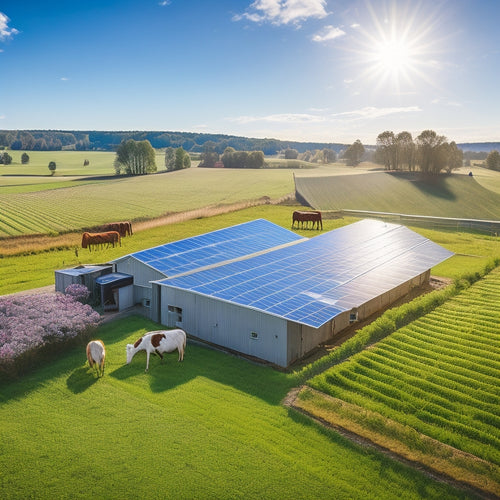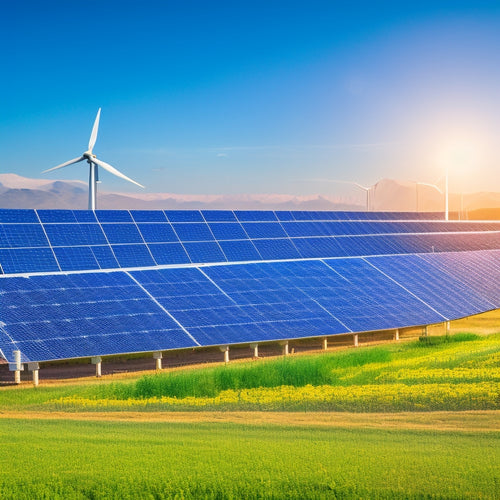
What Is the Future of Home Energy Storage?
Share
As you contemplate moving towards a more sustainable energy future, you're likely to find that home energy storage systems, driven by declining costs and technological advancements, are poised to play a critical role in reducing your reliance on the grid and minimizing your carbon footprint. With the rapid decline in costs of solar panels and energy storage systems, achieving grid parity in many regions, and integration with smart home technologies for optimized energy management, the future of home energy storage looks promising. As you explore the benefits of off-grid energy systems and the evolution of home battery technology, you'll discover even more opportunities to enhance your energy independence.
Key Takeaways
• Home energy storage will become increasingly crucial as renewable energy sources become more prevalent, enabling households to store excess energy for later use.
• Advances in battery technology will drive down costs, increase efficiency, and extend lifespan, making home energy storage more accessible and affordable.
• Integration with smart home technologies will optimize energy management, allowing households to monitor and control their energy usage in real-time.
• The future of home energy storage will be shaped by declining technology costs, rising climate change awareness, and government incentives promoting green energy investments.
• As the world transitions to a more sustainable energy future, home energy storage will play a critical role in reducing carbon emissions and achieving energy independence.
Advancements in Solar Energy Storage
As you explore the world of renewable energy, you'll discover that advancements in solar energy storage have enabled homeowners to access and utilize excess energy generated by photovoltaic (PV) systems during the day for later use, greatly reducing reliance on the grid. This breakthrough has been facilitated by the rapid decline in costs of solar panels and energy storage systems, achieving Grid Parity in many regions.
The cost decline of solar energy storage systems has made it more economical for homeowners to invest in renewable energy solutions, increasing adoption rates and reducing carbon emissions.
The integration of solar energy storage systems with smart home technologies has optimized energy management, allowing homeowners to monitor and control their energy usage in real-time. This synergy has opened up new possibilities for homeowners to generate, store, and consume clean energy, reducing their reliance on the grid and mitigating peak-hour energy consumption.
As the cost of solar energy storage continues to decline, we can expect to see widespread adoption, paving the way for a more sustainable energy future.
Benefits of Off-Grid Energy Systems
With off-grid energy systems, you can sever your reliance on the grid, gaining energy independence and shielding yourself from unpredictable utility rate hikes and power outages. This freedom from the grid brings numerous benefits, including:
| Benefits | Description |
|---|---|
| Energy Independence | Reduce your reliance on the grid and enjoy predictable energy costs |
| Grid Resilience | Protect yourself from power outages and grid failures |
| Increased Property Value | Off-grid energy systems can increase your property value |
| Reduced Carbon Footprint | Minimize your environmental impact with clean energy |
| Improved Energy Security | Enjoy enhanced energy security and reduced risk of power outages |
Evolution of Home Battery Technology
You've witnessed a remarkable transformation in home battery technology over the past decade, driven by advances in materials science and economies of scale. The result is a significant reduction in cost and a substantial increase in performance. This evolution has led to the development of more efficient and affordable energy storage systems, making it more accessible to homeowners.
Additionally, as a homeowner, you can now enjoy cost savings by storing excess energy generated by your solar panels or wind turbines during the day and using it at night or during power outages. Furthermore, advancements in battery durability have extended the lifespan of home batteries, reducing the need for frequent replacements and further increasing the overall value proposition.
With continued innovation, home battery technology is poised to play a critical role in the future of home energy storage, enabling homeowners to optimize their energy usage, reduce their reliance on the grid, and minimize their carbon footprint.
Rise of Renewable Energy Sources
Your pursuit of energy independence has likely led you to explore renewable energy sources, which have become increasingly viable alternatives to fossil fuels in recent years.
As you investigate further, you'll find that the rise of renewable energy sources has been driven by declining costs and increasing efficiency. The levelized cost of electricity (LCOE) from solar and wind power has reached Grid Parity in many regions, making them competitive with fossil fuels.
This shift is further accelerated by Carbon Pricing mechanisms, which assign a financial cost to carbon emissions, making renewable energy a more attractive option. As a result, the share of renewable energy in the global energy mix is expected to continue growing.
With the cost of renewable energy decreasing, it's becoming more feasible to integrate these sources into your home energy system, paving the way for a more sustainable and independent energy future.
As you explore home energy storage solutions, it's important to take into account the role of renewable energy sources in your overall strategy.
Trends in Green Energy Adoption
As governments and consumers increasingly prioritize environmental sustainability, green energy adoption is experiencing rapid growth, driven by declining technology costs and rising awareness of climate change. You're likely noticing the shift towards renewable energy sources, such as solar and wind power, becoming more mainstream. This trend is fueled by government incentives, which provide financial benefits to individuals and businesses investing in green energy. For instance, tax credits and rebates are encouraging homeowners to install solar panels and energy storage systems.
Additionally, carbon pricing mechanisms are being implemented globally, making fossil fuels a more expensive option. As a result, you're seeing a surge in demand for clean energy solutions. In response, companies are developing innovative products and services to cater to this growing market. You're probably aware of the increasing popularity of electric vehicles, energy-efficient appliances, and smart home systems.
As the cost of renewable energy continues to decrease, you can expect even more widespread adoption of green energy technologies in the coming years.
Frequently Asked Questions
Can I Use a Single Energy Storage System for Multiple Homes?
"Many hands make light work," and you're wondering if one energy storage system can serve multiple homes. The answer lies in neighborhood sharing and community grids, where a single system can be optimized to meet collective energy needs.
How Do I Properly Dispose of Old Home Energy Storage Batteries?
You'll need to properly dispose of old home energy storage batteries to minimize environmental impact; recycle them responsibly through designated facilities that adhere to battery recycling guidelines, ensuring a sustainable future.
Are Energy Storage Systems Compatible With All Electrical Panels?
'When you're considering energy storage systems, you'll find that compatibility with electrical panels depends on Panel Upgrades and adherence to specific Electrical Standards, ensuring seamless integration and peak performance in your home.'
Can Energy Storage Systems Be Used for Commercial Properties?
You can utilize energy storage systems for commercial properties, enhancing commercial benefits by reducing peak demand charges and increasing property values through backup power reliability and grid independence.
Do Home Energy Storage Systems Require Frequent Maintenance?
You'll be relieved to know that home energy storage systems require minimal upkeep; occasional battery inspection and system monitoring guarantee peak performance, with automated alerts for any issues, minimizing hands-on maintenance.
Related Posts
-

What Do I Need to Know About Farm Solar Panels
When considering farm solar panels, you need to assess costs, benefits, and technical specifics. Initial investment c...
-

The Role of Battery Monitoring Systems in Renewable Energy
Battery monitoring systems play an essential role in renewable energy by enhancing system longevity and optimizing pe...
-
Average Lifespan of Solar Battery Banks
The average lifespan of solar battery banks generally ranges from 5 to 15 years. This variation mainly stems from the...

